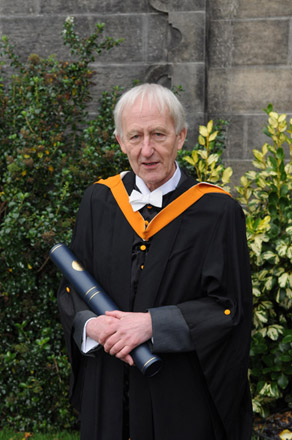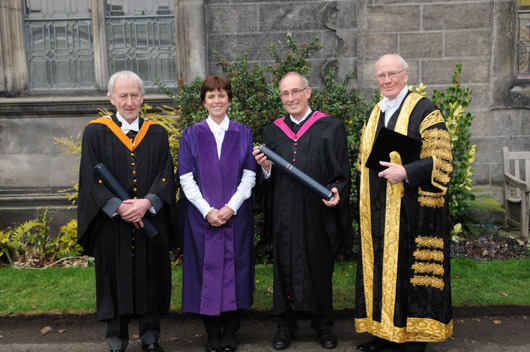Laureation address – Professor Myles Burnyeat
Professor Myles Burnyeat CBE BA FBA
Honorary Degree of Doctor of Letters
Laureation by Professor Sarah Broadie,
School of Philosophical, Anthropological & Film Studies
Friday 30 November 2012

Philosopher Professor Myles Burnyeat was awarded the honorary degree of Doctor of Letters (DLitt).
Chancellor, it is my privilege to present Myles Fredric Burnyeat for the Degree of Doctor of Letters honoris causa.
In classical studies, especially in the study of ancient Greek and Roman philosophy, Myles Burnyeat’s name is a byword for extraordinary humanistic achievement. Students of ancient thought at every level and in many countries are beholden to his example, in teaching as in research. His expertise ranges wide and deep over material stretching from the pre-socratic philosophers, to the great classical and Hellenistic figures, and on through a vast cavalcade of successors into late antiquity. Our grasp and appreciation of just about every shape and movement of thought in this thousand year sweep of philosophy has been informed, invigorated, and in some cases seriously corrected by Myles Burnyeat’s work.
Born at the outbreak of World War II, he went straight from school to National Service in the Royal Navy. This was an opportunity for living by the sea if not actually on it, since he was selected to train as a Russian interpreter at the legendary Joint Services School for Linguists at Crail. Thus was generated a warm if not particularly academic link with St Andrews. Viewed from surf-tormented Crail, the town of St Andrews shone as a beacon of comfort and civilization – even the much smaller town of the late nineteen-fifties. Visits here became a feature of life, carried out in true nineteen fifties style courtesy of a Lambretta scooter. Nor has memory faded of those gowns which the undergraduates back then had to wear after dark. But as Myles Burnyeat returns here today we primarily see him in a more impersonal local context, one that places him in a line of scholarship stretching back through the twentieth century to the time when our University played a noteworthy part in the history of ancient philosophy, through the presence of John Burnet and A. E. Taylor.
After taking his BA at Cambridge in Philosophy, he moved to the Philosophy Department at University College London, first as a student then for ten years as Lecturer in Philosophy, before returning to Cambridge to be a University Lecturer in Classics and College Lecturer in Philosophy at the newly founded Robinson College. From 1984 to 1996 he held Cambridge’s Laurence Chair of Ancient Philosophy, followed by ten years as Senior Research Fellow in Philosophy at All Souls College, Oxford. He has been a Fellow of the British Academy since 1984, and is a Foreign Honorary Member of the American Academy of Arts and Sciences. He has held between twenty and thirty named lectureships of the highest distinction all round the world in both classics and philosophy. In 2007 he was awarded the CBE for his services to scholarship.
These ‘services’ include authorship of dozens of papers that between them communicate an unsurpassed combination of philological command, historical understanding, and conceptual illumination. A selection has just appeared in two volumes entitled Explorations in Ancient and Modern Philosophy. He is perhaps most widely known as author of the twentieth century’s most influential book on Plato’s Theaetetus – that dialogue dearest to philosophers. His longer works include an original and exacting study of Plato’s Republic (given as the Tanner Lectures on Human Values at Harvard), and a ground-breaking monograph on Book Zeta of Aristotle’s Metaphysics. He has been an energetic editor and translator of unpublished or inaccessible work by other scholars; and he has nurtured educational connections far beyond the standard hubs of Europe and North America. His own work has been translated into Japanese and into nine European languages in addition to French, German, Italian, and Spanish. He has regularly addressed the wider public, with numerous contributions to the Listener (that was a long time ago!), the Times Literary Supplement, the New York Review of Books, the London Review of Books, as well as to radio and television. His pieces on Leo Strauss and I. F. Stone have lost none of their original scintillation. And finally, Myles Burnyeat has always been a tireless and generous teacher at every level, from undergraduates onwards. Countless people have been helped by his detailed interest in their work.
Above all, he is a paradigm to philosophers and classicists for combining formidable learning with first hand engagement in philosophy’s own concerns: principally its concerns with ethics and epistemology. His writings on the ancients take issue with such moderns as Russell, Moore, Wittgenstein, Descartes, Berkeley, and for that matter Ronald Dworkin. The aim – in which he has set and achieved the highest standards – isn’t simply to compare different specimens of the genus ‘philosopher’, but to open us up to the transformative toing and froing of philosophy as an on-going enterprise.
Chancellor, in recognition of his superb intellectual leadership in the history of philosophy, I invite you to confer on Myles Burnyeat the Degree of Doctor of Letters honoris causa.

L-R: Professor Myles Burnyeat (Honorary Degree of Doctor of Letters), Principal and Vice-Chancellor Professor Louise Richardson, Professor Iain D Campbell (Honorary Degree of Doctor of Science) and Chancellor Sir Menzies Campbell.
Category Awards